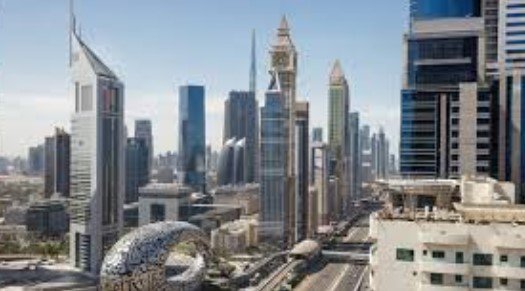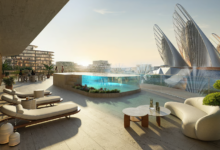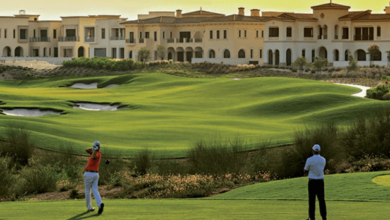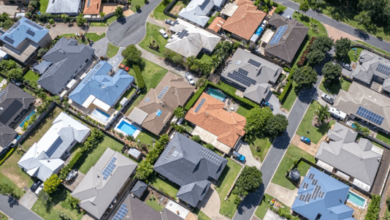Unlocking Dubai’s Real Estate Potential: A Modern Investor’s Guide

Introduction to Dubai’s Real Estate Market
Dubai, a vibrant city in the United Arab Emirates (UAE), has become a global hub for real estate investment, attracting investors from around the world. Over the past few decades, the city has transformed from a desert outpost to a modern metropolis, offering a wide range of investment opportunities. The real estate market in Dubai is known for its high returns, diverse property types, and a business-friendly environment, making it an attractive destination for both local and international investors.
Historical Growth and Development
Dubai’s real estate sector has seen exponential growth since the early 2000s. The city’s visionary leadership, coupled with a series of mega projects such as Palm Jumeirah, Burj Khalifa, and Dubai Marina, has positioned Dubai as a prime location for real estate investments. These developments have not only enhanced Dubai’s global profile but also contributed significantly to its economic growth.
In the past, the government’s policies have also played a crucial role in shaping the real estate landscape. The introduction of freehold property ownership for foreigners in designated areas in 2002 opened up the market, leading to an influx of international investors. This policy shift marked a turning point in Dubai’s real estate sector, propelling it onto the global stage.
Current Market Trends
Today, Dubai’s real estate market is characterized by a mix of stability and innovation. The market has shown resilience in the face of global economic challenges, maintaining a steady demand for both residential and commercial properties. The shift towards more sustainable and technology-driven developments is evident, with an increasing number of projects focusing on smart homes and green buildings.
Another notable trend is the growth of the rental market. With high rental yields compared to other global cities, Dubai remains an attractive location for buy-to-let investors. The demand for short-term rentals, particularly in tourist-heavy areas, continues to grow, providing investors with flexible income options.
Future Projections and Potential
Looking ahead, Dubai’s real estate market is poised for sustained growth. The government’s commitment to economic diversification and the ambitious Dubai 2040 Urban Master Plan will drive future developments. This plan focuses on making Dubai a city of choice for residents, investors, and visitors, with a strong emphasis on sustainability, infrastructure development, and community living.
Investors can expect opportunities in new and emerging neighborhoods as the city continues to expand. Areas like Dubai South, Expo City Dubai, and Mohammed Bin Rashid City are set to become the next big investment hubs, driven by upcoming projects and infrastructural advancements.
Key Investment Opportunities in Dubai
Residential Properties
Dubai offers a variety of residential properties ranging from luxury villas to affordable housing units. This diversity caters to a broad spectrum of investors, each seeking different returns and investment strategies.
Luxury Villas and Apartments
Luxury properties in Dubai, particularly those located in areas like Palm Jumeirah, Emirates Hills, and Downtown Dubai, are highly sought after by high-net-worth individuals (HNWIs) and international investors. These properties are known for their premium amenities, exclusive locations, and high capital appreciation potential.
Luxury villas, often situated in gated communities with private beaches or golf courses, offer a unique investment proposition. Similarly, high-end apartments in skyscrapers like Burj Khalifa and Address Downtown continue to attract global interest due to their prestige and world-class facilities.
Affordable Housing Options
On the other end of the spectrum, there is a growing demand for affordable housing in Dubai. The government’s efforts to provide affordable housing options have led to the development of several projects aimed at middle-income earners. These properties, typically located in areas like Dubai Silicon Oasis, Jumeirah Village Circle, and Al Furjan, provide a good entry point for first-time investors looking for stable rental income.
Commercial Real Estate
Dubai’s commercial real estate market offers robust investment opportunities, particularly in office spaces and retail units. The city’s strategic location, as a gateway between the East and West, makes it an ideal base for international businesses, boosting the demand for commercial properties.
Office Spaces
The demand for office spaces in Dubai has been on the rise, driven by the city’s economic growth and the influx of multinational companies. Areas such as Business Bay, Dubai International Financial Centre (DIFC), and Jumeirah Lake Towers (JLT) are popular choices for office investments due to their prime locations and modern infrastructure.
Office spaces in these areas often come with flexible leasing options, making them attractive to both local businesses and international firms. Additionally, the rise of remote work and flexible office solutions has led to increased interest in coworking spaces, providing another avenue for investment.
Retail Spaces
Retail real estate in Dubai remains a lucrative investment option, thanks to the city’s thriving tourism sector and consumer culture. Shopping malls, high-street shops, and boutique retail spaces continue to attract significant investor interest. Areas like Downtown Dubai, Mall of the Emirates, and Dubai Marina Mall are particularly popular, driven by high footfall and a steady stream of tourists.
Investors looking to diversify their portfolios can consider retail units in these areas, which offer attractive rental yields and long-term capital appreciation.
Industrial and Logistics Properties
Dubai’s strategic position as a global trade hub makes it an ideal location for industrial and logistics investments. The demand for warehousing and logistics facilities has been on the rise, driven by the growth of e-commerce and the city’s role as a regional distribution center.
Areas like Dubai South, Jebel Ali Free Zone (JAFZA), and Dubai Industrial City offer excellent opportunities for investors looking to tap into the logistics and supply chain sectors. These zones provide state-of-the-art facilities, robust infrastructure, and easy access to key transport routes, enhancing their appeal to businesses and investors alike.
Read also: Navigating Real Estate Tax Strategies: Maximizing Profits and Minimizing Liabilities
Factors Driving Investment in Dubai Real Estate
Strategic Location and Connectivity
Dubai’s strategic geographical location between Europe, Asia, and Africa makes it a central hub for global trade, tourism, and business. The city’s world-class infrastructure, including one of the busiest airports globally and a major seaport, enhances its appeal to investors. This connectivity not only supports economic growth but also drives demand for real estate across various sectors.
Economic Stability and Growth
Dubai’s economy has demonstrated remarkable stability and growth over the years, bolstered by diversification efforts beyond oil and gas. The emirate has positioned itself as a global business hub, with strong sectors in tourism, finance, trade, and real estate. This economic stability creates a favorable environment for real estate investments, offering predictable and stable returns.
Investor-Friendly Policies
Dubai is known for its investor-friendly policies, including a favorable tax regime (with no property tax or capital gains tax), freehold ownership opportunities for foreigners, and streamlined property transaction processes. These policies have made Dubai one of the most attractive real estate markets globally, encouraging a continuous influx of international investors.
High Rental Yields and Return on Investment (ROI)
Dubai offers some of the highest rental yields in the world, particularly for residential properties. Investors can expect rental returns ranging from 6% to 10%, which is significantly higher compared to other global cities. Additionally, the potential for capital appreciation further enhances the overall return on investment (ROI), making Dubai a compelling choice for real estate investors.
Understanding Dubai’s Real Estate Regulations
Legal Framework and Ownership Rights
Dubai’s real estate market is governed by a clear and transparent legal framework designed to protect investors and property owners. The Real Estate Regulatory Agency (RERA) oversees property transactions, ensuring that they comply with local laws. Foreign investors can own freehold properties in designated areas, providing them with full ownership rights.
Financing and Mortgage Options
Investors have access to a wide range of financing options, including mortgages provided by both local and international banks. The mortgage market in Dubai is well-regulated, offering competitive interest rates and flexible terms. It is essential for investors to understand the various financing options available and choose the one that best suits their investment strategy.
Tax Implications and Benefits
One of the key advantages of investing in Dubai real estate is the favorable tax environment. There are no property taxes or capital gains taxes, which significantly reduces the cost of ownership and enhances profitability. However, investors should be aware of other costs, such as service charges and maintenance fees, which vary depending on the property type and location.
Tips for First-Time Investors in Dubai
Choosing the Right Location
Location is a critical factor in real estate investment, and Dubai offers a diverse range of neighborhoods, each with its unique characteristics and potential. Investors should conduct thorough research to identify areas that align with their investment goals, whether it is high rental yields, capital appreciation, or a mix of both.
Partnering with Reputable Developers and Agents
Working with reputable developers and real estate agents can significantly reduce investment risks. Reputable developers are known for delivering high-quality projects on time, while experienced agents can provide valuable insights into market trends, property valuations, and investment opportunities.
Understanding Market Cycles
The real estate market in Dubai, like any other market, is subject to cyclical changes. Investors should be aware of market cycles and trends to make informed decisions about when to buy or sell properties. Staying updated with market news and engaging with local experts can help investors navigate these cycles effectively.
Risk Management Strategies
Real estate investment inherently involves risks, and it is crucial for investors to have a solid risk management strategy. Diversifying the investment portfolio, conducting due diligence, and understanding legal obligations are some of the ways investors can mitigate risks and protect their investments.
High-Growth Areas and Upcoming Developments
Dubai Marina and Jumeirah Beach Residence (JBR)
Dubai Marina and Jumeirah Beach Residence (JBR) are among the most sought-after areas for real estate investment, known for their high-end apartments, waterfront living, and vibrant lifestyle. These areas continue to attract both residents and tourists, driving demand for properties and offering excellent rental yields.
Downtown Dubai and Business Bay
Downtown Dubai, home to iconic landmarks like Burj Khalifa and Dubai Mall, remains a prime location for real estate investments. Business Bay, with its strategic location and growing commercial hub, is also becoming a hotspot for investors seeking both residential and commercial properties.
Emerging Neighborhoods
Emerging neighborhoods such as Dubai South, Expo City Dubai, and Al Furjan are gaining attention from investors due to their potential for high growth and development. These areas are poised for significant infrastructure developments, making them attractive for long-term investments.
Technology and Innovation in Dubai Real Estate
Smart Homes and Sustainable Buildings
Dubai is at the forefront of integrating technology into real estate, with a growing emphasis on smart homes and sustainable buildings. These innovations not only improve the quality of living but also enhance property values, making them a lucrative option for investors.
PropTech Innovations
The rise of PropTech (property technology) is revolutionizing Dubai’s real estate sector, with innovations such as virtual property tours, AI-driven property management, and blockchain-based transactions. Investors who embrace these technologies can gain a competitive edge in the market.
Dubai’s Luxury Real Estate Market
Ultra-High-Net-Worth Investments
Dubai’s luxury real estate market is a playground for ultra-high-net-worth individuals (UHNWIs), offering exclusive properties in prestigious locations. These properties are not only status symbols but also valuable assets that offer significant returns and long-term value appreciation.
Exclusive Communities and Developments
Exclusive communities such as Emirates Hills, Palm Jumeirah, and Al Barari offer unique investment opportunities in gated communities with high levels of security, privacy, and amenities. These properties are highly desirable, driving demand and ensuring sustained capital growth.
Investing in Off-Plan Properties
Benefits and Risks
Investing in off-plan properties in Dubai can offer several benefits, including lower entry costs, flexible payment plans, and the potential for high returns upon project completion. However, there are also risks involved, such as construction delays and market fluctuations. Investors should carefully assess these factors before committing to off-plan investments.
How to Evaluate Off-Plan Opportunities
Evaluating off-plan properties requires thorough research and due diligence. Investors should consider the reputation of the developer, the location of the project, the expected completion date, and the payment plan structure. Engaging with real estate professionals and conducting site visits can also provide valuable insights.
Case Studies of Successful Investments in Dubai
Notable Deals and Developments
Several high-profile real estate deals and developments in Dubai serve as case studies for successful investments. For instance, the acquisition of prime commercial spaces in Business Bay by international firms highlights the strong demand and investment potential in this area.
Lessons Learned from Top Investors
Top investors in Dubai’s real estate market have leveraged strategic planning, market knowledge, and strong networks to achieve success. Learning from their experiences can provide valuable lessons for new investors looking to make their mark in the Dubai real estate scene.
Conclusion
Recap of Key Insights
Dubai’s real estate market offers a wealth of opportunities for investors, driven by strong economic fundamentals, strategic location, and investor-friendly policies. From luxury villas to commercial spaces, the market caters to a wide range of investment preferences and strategies.
Final Thoughts for Prospective Investors
Prospective investors should approach the Dubai real estate market with a clear strategy, thorough research, and a willingness to embrace innovation. With the right approach, investing in Dubai can offer substantial returns and contribute to a diversified investment portfolio.
FAQs
What are the best areas to invest in Dubai?
The best areas to invest in Dubai include Downtown Dubai, Dubai Marina, Business Bay, and emerging neighborhoods like Dubai South and Expo City Dubai. These areas offer a mix of high rental yields, capital appreciation, and growth potential.
How can I finance a property purchase in Dubai?
Financing options in Dubai include mortgages from local and international banks, as well as developer financing schemes. It is essential to compare different financing options to find the one that best suits your investment needs.
Are there any restrictions for foreign investors in Dubai?
Foreign investors can own freehold properties in designated areas of Dubai. There are no major restrictions, but investors must comply with local laws and regulations governing property ownership and transactions.
What is the typical ROI for Dubai real estate investments?
The typical ROI for Dubai real estate investments ranges from 6% to 10%, depending on the property type, location, and market conditions. High-end residential properties and commercial spaces generally offer higher returns.
How does the property tax system work in Dubai?
Dubai has a favorable tax environment with no property tax or capital gains tax. However, investors should be aware of other costs, such as service charges, maintenance fees, and registration fees.
What are the risks associated with investing in Dubai real estate?
Risks associated with investing in Dubai real estate include market fluctuations, regulatory changes, and construction delays for off-plan properties. It is essential to conduct thorough due diligence and work with reputable developers and agents to mitigate these risks.







